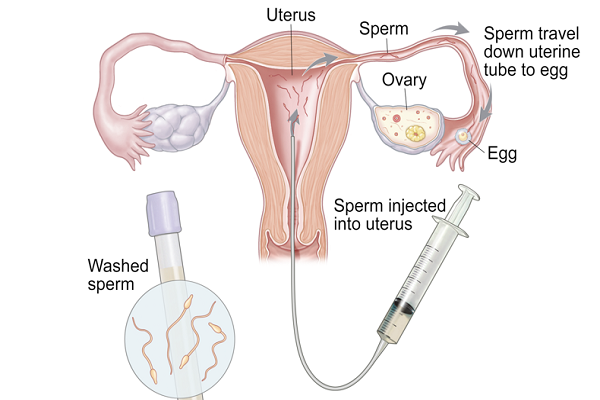
Intrauterine Insemination (IUI)

IUI is one of the simpler methods of assisted conception, which may be considered for suitable couples.
What is IUI?
Intrauterine Insemination (IUI) is a fertility procedure in which sperm are injected directly into the woman’s uterus. Around the time ovary releases one or more eggs, the washed and concentrated sperm are placed closer to the egg through the cervix to be fertilized. In natural intercourse, the entire male ejaculate is normally deposited in the vagina and only a fraction of sperm makes it into the fallopian tubes where fertilisation takes place. IUI aims to increase this number and makes sure that sperm are present at the right place at the right time.
Types of IUI
Depending on the reasons for infertility, IUI can be coordinated with your normal cycle or with fertility medications.
- Natural cycle IUI
- Stimulated cycle IUI
Indications for IUI
- If male partner is unable to have vaginal sex because of a physical disability or psychosexual problem- impotence or premature ejaculation.
- Ovulation problems including an absence of ovulation or a reduced number of eggs.
- Unexplained infertility -IUI is preferred as a first line treatment along with ovulation-inducing medication.
- Mild male factor infertility – IUI can overcome some of problems such as weak movement, reduced number and abnormal shape of sperm because preparing sperm for the procedure helps separate highly motile, normal sperm from those of lower quality.
- Cervical factor infertility – Sometimes the cervix itself may also prevent sperm from reaching the egg such as thick mucus or stenosed cervix. IUI bypasses your cervix, depositing sperm directly into your uterus and increasing the number of sperm available to meet the awaiting egg.
- If one among the couple has HIV and it’s not safe to have unprotected sex, IUI is needed for such couples to conceive.
- Fertility preservation – Men may collect and freeze (cryopreserve) their sperm for future use before having a testicular surgery, or radiation/chemotherapy treatment for cancer. The sperm may be thawed later and used for IUI.
- Third-party reproduction – IUI is also utilized when couples are requesting donor sperm. Frozen donor sperm specimens are obtained from certified labs and thawed before the IUI procedure.
Prerequisites for IUI
- Screening blood tests are carried out on both partners for Hepatitis B and C, HIV.
- A semen analysis will be carried out to ensure that that there is no significant problem with sperm numbers or sperm quality so that the sperm can be prepared adequately.
- Tubal patency test – both fallopian tubes or atleast one side tube should be open and healthy to begin IUI process.
What happens during IUI procedure?
- Ovulation monitoring – If there is one or more eggs produced on ultrasound in natural cycle or stimulated cycle IUI can be planned.
- Optimal timing – Around the time ovary releases one or more eggs (24 to 48 hrs after trigger injection) or after confirming release of egg by USG.
- Sperm collection – Male partner will be asked to produce a sperm sample by masturbation on the day the treatment takes place.
- Semen preparation – The sperm are washed to remove the fluid surrounding them and the rapidly moving sperm separated out.
How is IUI done?
The rapidly moving sperm are placed in a small catheter (tube) to be inserted into the womb.
Are there any risks?
The risks involved with IUI are minimal.
Results
After about two weeks a pregnancy test is done.
What if IUI result is negative?
If you don’t become pregnant, you might try IUI again for about 2 to 3 attempts before moving on to other fertility treatments.
Your chances of success with IUI
There are many different factors involved determining individual chances of success such as
- The woman’s age
- The cause of infertility
- Whether fertility injections are used to stimulate ovulation (this can increase your chances of success)
- Sperm count and sperm quality (using fresh sperm leads to higher conception rates than using frozen sperm)
